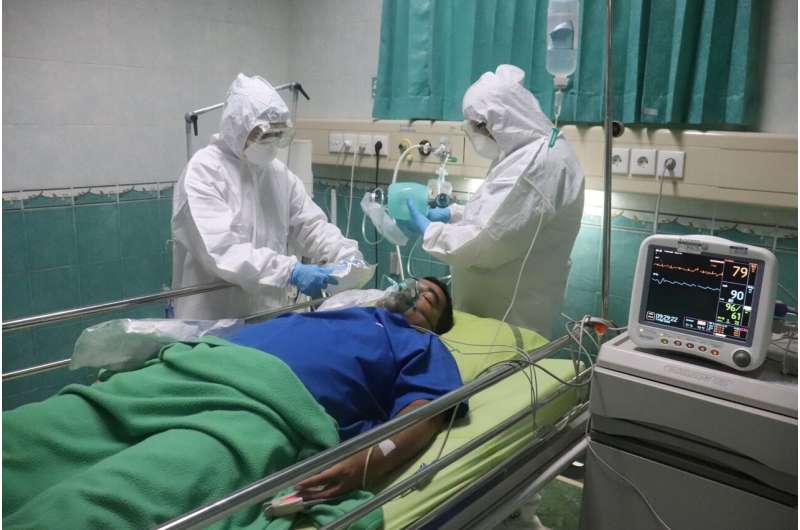This article has been reviewed according to Science X's editorial process and policies. Editors have highlighted the following attributes while ensuring the content's credibility:
fact-checked
trusted source
proofread
Heart attack outcomes are far worse for those with COVID-19, new study shows

New research from the Smidt Heart Institute at Cedars-Sinai shows that patients who went to a hospital with a heart attack and were simultaneously sick with COVID-19 were three times more likely to die than patients experiencing a heart attack without a COVID-19 infection.
The study—published in Current Problems in Cardiology—also found that the Black, Hispanic, Asian and Pacific Islander patients who had both COVID-19 and an acute myocardial infarction (AMI, the medical term for a heart attack)—fared worse than their white counterparts.
"The COVID-19 pandemic had a significant impact on heart attack patients and disrupted optimal care that led to delays and changes in traditional, often lifesaving treatment approaches," said Martha Gulati, MD, director of Preventive Cardiology in the Smidt Heart Institute and the study's senior author. "Most importantly, we found significant racial disparities in the management of AMI in patients with concurrent COVID-19, with Black, Hispanic, Asian, and Pacific Islander patients receiving lower rates of treatment when compared to white patients."
Gulati, the Anita Dann Friedman Endowed Chair in Women's Cardiovascular Medicine and Research and the associate director of the Barbra Streisand Women's Heart Center, said these findings point to the urgent need to address disparities and enhance access to care.
As investigators explain, the COVID-19 pandemic put a spotlight on gaps in cardiovascular care that already existed based on race and ethnicity. Addressing these disparities in health care urgently requires a multifaceted approach.
"While this study provides valuable insight, it is one piece of the puzzle," said Christine M. Albert, MD, MPH, chair of the Department of Cardiology in the Smidt Heart Institute. "Addressing health care disparities, particularly during a global pandemic, requires a concerted effort from all stakeholders, including policymakers, health care providers, and the community at large."
The Cedars-Sinai Newsroom sat down with Gulati to learn how the findings of this research study prompted ideas on addressing health care disparities and enhancing access to care.
Please share your recommendations on how best to address health care disparities and enhance access to care.
Gulati: There are four main ways to address these disparities, which include improving access; providing culturally sensitive care; addressing social determinants of health; and policy changes.
How might the medical field improve access?
Gulati: We must increase access to high-quality health care in and for underserved communities. This could include establishing more medical offices in these areas, improving transportation to health care facilities, and enhancing telehealth capabilities.
How can providers better provide culturally sensitive care?
Gulati: We must first ensure that health care providers are trained to provide culturally sensitive care. This includes understanding and respecting cultural differences, addressing language barriers and actively combating biases and stereotypes.
What are some of the ways the broader medical community can address social determinants of health?
Gulati: We must address the social determinants of health that contribute to these disparities. This includes efforts to reduce poverty, improve education, and provide safe and secure housing.
How can policy changes make an impact?
Gulati: Implementing policy changes to reduce systemic bias and racism in the health care system could involve changes to how care is funded. This might include assessing measures of quality, rewarding quality care and better identifying how resources are allocated.
Additional Cedars-Sinai investigators include Amer Muhyieddeen, MD, and Susan Cheng, MD, MPH.
More information: Amer Muhyieddeen et al, Racial Disparities in Mortality Associated With Acute Myocardial Infarction and COVID-19 in the United States: A Nationwide Analysis, Current Problems in Cardiology (2023). DOI: 10.1016/j.cpcardiol.2023.101798





















